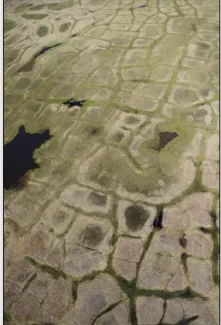Spatial and temporal controls on nitrogen availability in polygonal tundra landscapes
Date Published
Several scaling strategies based on geomorphology were evaluated for complex polygonal landscapes.
Objective
- Quantify nitrogen availability across polygonal tundra and assess how biogeochemical cycling of nitrogen can be scaled for purposes of regional modeling.
New Science
- Several scaling strategies based on geomorphology were evaluated for complex polygonal landscapes.
Impact
- Spatial variation in nitrate and ammonium concentrations were determined using a network of ion exchange resins. Soil moisture and temperature were major determinants of nitrogen availability. Nitrogen availability, and nitrate and ammonium concentrations, covaried with landscape position.
Citation(s)
Funding
This research was supported by the Director, Office of Science, Office of Biological and Environmental Research of the US Department of Energy under Contract No. DE-AC02-05CH11231 as part of the Next-Generation Ecosystem Experiments (NGEE Arctic) project.
For more information, please contact:
Richard Norby
norbyrj@ornl.gov

